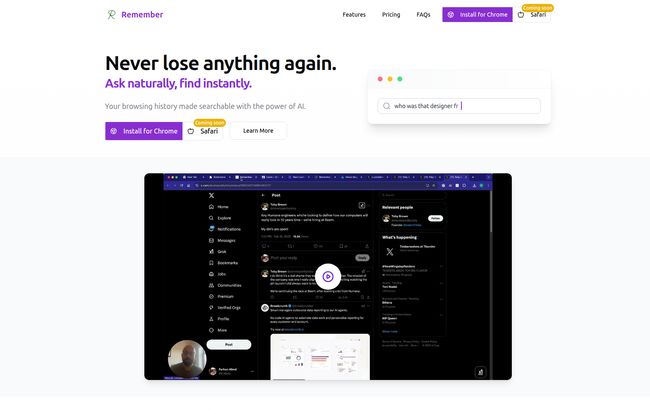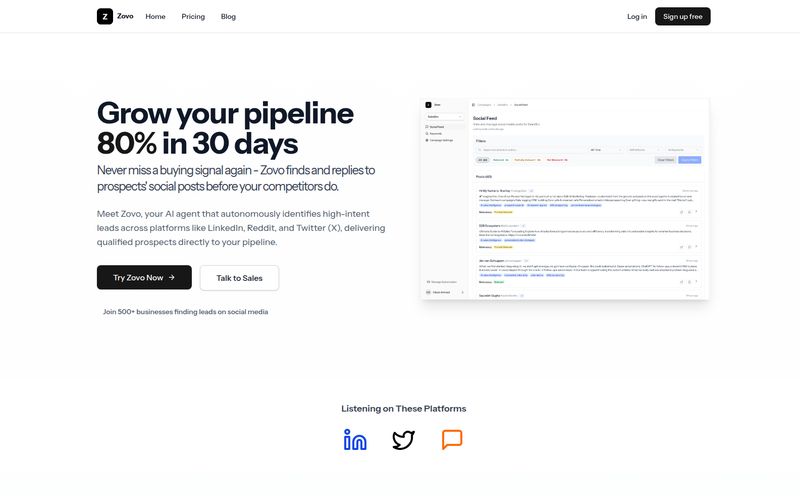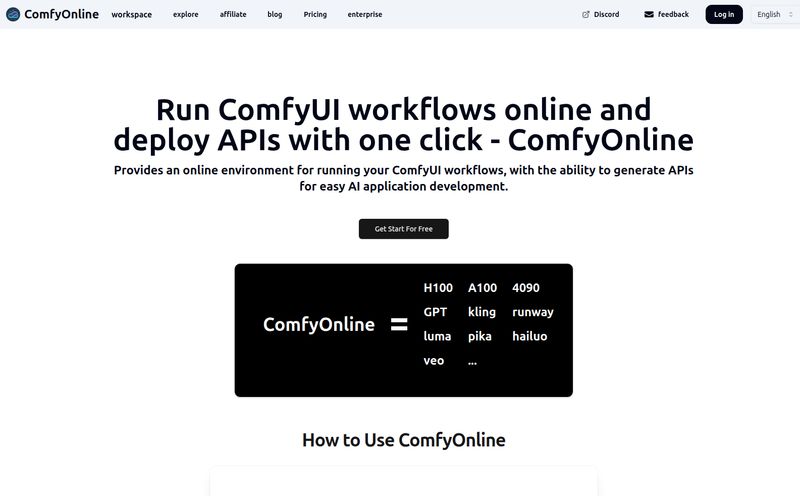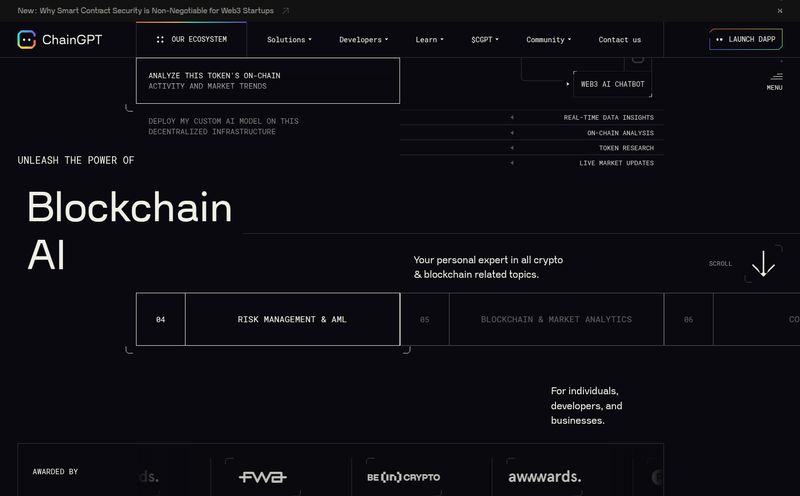If you're anything like me, your browser history is a chaotic wasteland of forgotten articles, half-remembered tutorials, and that one weird recipe for avocado pasta you swore you'd try. Finding anything in there is like digital archeology. You vaguely remember the site's color scheme and maybe one word from the headline. Good luck with that.
We've tried it all, right? Bookmarking everything until our bookmark bar is an unusable mess. Leaving a hundred tabs open until our computer begs for mercy. It’s a constant battle against digital amnesia. For years, I’ve just accepted this as the cost of doing business online.
Then a little tool called Remember drifted across my screen. Its promise is simple and bold: "Never lose anything again." My first thought? Yeah, right. I've heard that one before. But this one had a twist—it uses AI to make your browsing history genuinely searchable with normal, human language. My curiosity was piqued. So I took it for a spin.
So, What is Remember, Really?
Okay, let's break it down. Remember isn't another bookmark manager. Thank goodness. It’s a browser extension (currently for Chrome, with Safari on the way) that acts like a personal search engine for your own web activity. As you browse, it works quietly in the background, using AI to understand the context of the pages you visit.
Think of it less like a logbook and more like a librarian for your brain. Instead of just remembering a URL and a title, it remembers the concepts, the people mentioned, the key ideas. This transforms your browsing history from a dumb, chronological list into a smart, searchable knowledge base. All with zero manual effort. That last part is what really got my attention.

Visit Remember
The Core Features That Actually Matter
A tool can have a flashy landing page, but what's it like in the trenches? Here’s what stood out to me during day-to-day use.
Smart Search That Feels Like Magic
This is the headline feature, and it delivers. The other day, I was trying to find an article about a specific CSS technique for grid layouts I'd seen on some designer's blog. I couldn't remember the designer's name or the blog's name. My search in Remember was literally: "css grid article from that designer blog last week". And boom, there it was. This is worlds away from the keyword-matching game you play with standard browser history. It understands intent, and that’s a pretty big deal.
A Silent, Tireless Browsing Companion
The best tools are the ones you forget are even there until you need them. Remember is exactly that. There's no button to click to "save" a page. No tagging, no organizing folders. You just browse the web like you always do. It silently indexes your activity, creating what they call your personal knowledge base. It's the definition of a "set it and forget it" utility, which is a massive plus for anyone who bristles at the thought of more digital admin work.
Privacy First, Not an Afterthought
Here's where my inner skeptic usually pipes up. An AI reading my browsing history? Uh oh. But the Remember team seems to have anticipated this. The tool is built with a local-first approach. This means the index of your history, the embeddings, and all that sensitive data are stored directly on your computer. According to their site, the cloud models they use for processing have Zero Data Retention policies. This is a refreshing stance in an industry that often treats user data like a commodity. It’s a big green flag for me.
Syncing Without a Snag
We don't live on one device anymore. I'm constantly bouncing between my desktop, my laptop, and my phone. Remember offers cross-device sync. If I look up something on my work machine, I can find it later on my phone while I’m on the couch. This seamlessness is critical for a tool like this to be truly useful. No one wants a fragmented memory.
Let's Talk Money, Honey: The Pricing Breakdown
Alright, the all-important question: what's it gonna cost? The pricing structure is actually pretty smart and accommodating, which I appreciate. They have three main tiers.
| Plan | Price | Key Features |
|---|---|---|
| Free | $0 / forever | Processes up to 500 pages, full search, and cross-device sync. |
| Premium | $5 / month | Unlimited pages, cross-device sync, and a native iOS app. |
| Bring Your Own API Key | $30 / one-time | Use your own OpenAI key for processing, complete usage control, lifetime access. |
My take? The Free plan is incredibly generous. 500 pages is more than enough to see if the tool genuinely fits into your workflow. The Premium plan is a no-brainer for power users, researchers, or anyone who lives on the web. But the Bring Your Own API Key (BYOAK) option... that's interesting. It's a nod to the tech-savvy crowd who might already be paying for an OpenAI API key. A $30 one-time fee for lifetime access is a fantastic deal for the right person. It shows they understand their audience.
My Honest Take: The Good and The... Less Good
I've seen a lot of productivity tools come and go. Most are just hype. Remember feels different, but it's not perfect. Nothing is.
The biggest pro is that feeling of relief when you find something you thought was lost forever. It has genuinely saved me time and frustration. It’s like getting a small superpower. The freedom from having to consciously bookmark pages is another huge win. My digital life feels a little less cluttered, a little more automated.
On the other side of the coin, it's still another browser extension. If you're militant about keeping your browser lean, that's a hurdle. And while the AI is impressive, it's still AI. It's not infallible. There might be times it misinterprets a query or can't find something you know you saw. You also have to place a certain amount of trust in their privacy policy, even if it is local-first. It's a calculation everyone has to make for themselves.
Who Is This Tool Actually For?
So, who should drop what they're doing and install this? I'd say it's for the "digital knowledge worker." If you're a writer, a developer, a student, a marketer, or a researcher, this could be a game-changer. It's for the person with 30 tabs open who's terrified of losing a golden nugget of information. It's for the digital packrat who wants to keep everything but hates the mess.
If you're a very casual internet user, maybe you check the news and social media, this might be overkill. But for anyone whose job or passion involves deep-diving into the web, it's absolutely worth a look.
Frequently Asked Questions
I had some questions myself, and here are some common ones I've seen pop up.
- How is this different from my browser's regular history?
- Your regular history (Ctrl+H) is just a list of links and times. It’s dumb. Remember is smart. It understands the content of the pages, allowing you to search with natural language and concepts, not just keywords you hope are in the title.
- How exactly does it work without sending my data everywhere?
- It processes the pages you visit and creates a representation (metadata and embeddings) that gets stored locally on your machine. For the AI part, it calls out to an OpenAI server but with a Zero Data Retention policy, meaning they dont store your stuff. It's a solid privacy-centric model.
- Is my browsing data secure?
- As secure as your own computer, since that's where the data is stored. This is a major advantage over cloud-only services where your data lives on a company's server.
- Can I delete my history from Remember?
- Yes. You have full control and can delete your history whenever you want.
- Does it work in Incognito or Private mode?
- Most likely not. Browser extensions are typically disabled in private modes by default to protect the integrity of that privacy. And honestly, that's a good thing. Private should mean private.
- What’s the real benefit of the 'Bring Your Own API Key' plan?
- Control and cost. If you're already using the OpenAI API for other things, you can consolidate your billing. You have total control over the API usage, and the $30 one-time fee for the software itself is very appealing for long-term use.
Is Remember Worth It?
My final verdict? A resounding yes. It's a clever and well-executed solution to a problem I think most of us have just learned to live with. It’s not about just organizing information; its about augmenting your own memory.
In an age of information overload, tools that help us find the signal in the noise are invaluable. Remember does exactly that, turning the chaotic stream of your browsing into a personal, intelligent archive. It won’t solve all your problems, but it might just find that one webpage that does. And sometimes, that's more than enough.



